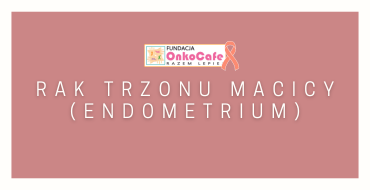Poland is one of the few European Union countries where mortality from endometrial cancer has been rising for several years. The diagnosis of this cancer is heard by several thousand Polish women every year - it is the fourth most common cancer among women in terms of the number of new cases recorded. The OnkoCafe - Together Better Foundation has decided to become involved in activities to raise public awareness and educate Polish endometrial cancer patients.
Endometrial cancer is an extremely important challenge for the health care system in Poland. It is the most common cancer of the female genital tract in Poland. What is more, among gynaecological cancers it is the only one in which the percentage of 5-year survival has recently decreased. This is a particularly alarming situation, especially in view of the fact that civilisation factors such as an unhealthy lifestyle, obesity and insufficient physical activity are responsible for a significant proportion of cases. Despite the growing problem, the voice of patients suffering from this cancer has not been heard so far. However, this may soon change thanks to the initiative of the OnkoCafe Foundation - Together Better.
– Although it represents the largest group of gynaecological cancers, endometrial cancer is still somewhat overshadowed by conditions such as ovarian cancer and cervical cancer. In the absence of comprehensive yet accessible information on the disease, women with endometrial cancer often have to deal with their own fears or doubts about their actual condition, prognosis or chances of successful treatment. As a result of numerous discussions with the clinical community, and in the face of alarming statistics, I saw a great need to act on behalf of this hitherto under-served group of patients - said Anna Kupiecka, President of the Board of the OnkoCafe Foundation - Together Better.
The activities Anna Kupiecka talks about are primarily educational and awareness-raising. In order to organise a community of patients and exchange information, as well as to create a kind of support group, the Foundation has set up a special group on Facebook, whose numbers are growing daily. At the same time, in collaboration with Dagmara Klasa-Mazurkiewicz, MD, PhD, from the Department of Perinatology at the Medical Faculty of the Gdańsk University of Medical Sciences, the OnkoCafe Foundation organised a webinar entitled "Endometrial cancer - what should every patient know?", during which patients had the opportunity to ask questions directly to the expert.
– I know from my own experience, and that of the organisation I lead, that there are therapeutic areas where patients can count on extensive organisational and educational support. Breast cancer patients are an example of such a well-organised group. Of course, there is still a lot to be done in this area in terms of raising public awareness or prevention activities, but compared with many other cancers, these patients are much better cared for and have relatively easy access to information about their disease, methods of diagnosis or treatment. Meanwhile, a very large group of women with endometrial cancer have so far been on their own. I saw how much these patients need coordination and access to information about their disease during our first webinar for this group. - Anna Kupiecka said.
There are more analogies between breast cancer and endometrial cancer. In the case of both cancers, we are not talking about one disease or one type of cancer. Depending on the presence of particular gene mutations or molecular status, we are actually dealing with different diseases. In endometrial cancer, the path of a patient with a mutation in the POLE gene, where treatment often ends after surgery and the risk of recurrence is relatively low, will look completely different from, for example, a patient with a deficit in unpaired base repair and microsatellite instability (dMMR/MSI), where, in the event of recurrence, immunotherapy would be the optimal treatment. However, in order to determine the treatment pathway, appropriate diagnostics are required, which is not at all standard.
– The questions raised by patients during our webinar clearly indicate that even at the stage of diagnosis, there are no uniform standards of management in Poland. An example is, for example, the approach to molecular tests, which, as experts point out, should be performed at the beginning and even before starting treatment, and are often not ordered at all. It is precisely in order to make patients aware of what they should expect or what questions they should ask the doctor, that we organise events such as the aforementioned webinar. The meeting aroused a lot of interest and I already have at least a few ideas in mind for future activities in this area - Anna Kupiecka concluded.
Link to Facebook group:

